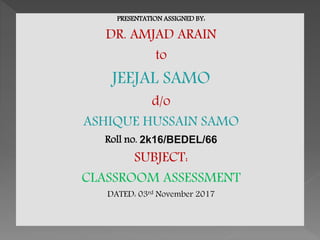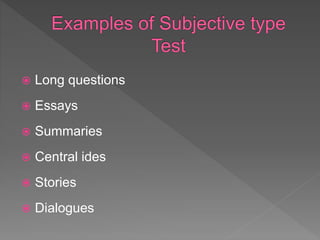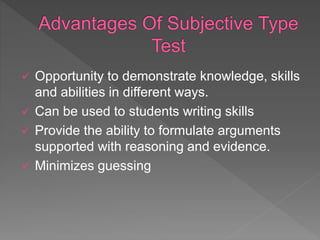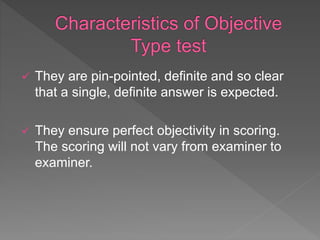Subjective and Objective Test
- 2. PRESENTATION ASSIGNED BY: DR. AMJAD ARAIN to JEEJAL SAMO d/o ASHIQUE HUSSAIN SAMO Roll no. 2k16/BEDEL/66 SUBJECT: CLASSROOM ASSESSMENT DATED: 03rd November 2017
- 3. Subjective type test Objective type test
- 4. Subjective Test Is a type of test in which the scores are influenced by the judgment of the evaluator, meaning there is no one correct answer. Subjective assessment is a form of questioning which may have more than one correct answer (or more than one way of expressing the correct answer).
- 5. A subjective test is evaluated by giving an opinion. Subjective tests are more challenging and expensive to prepare, administer and evaluate correctly. They can be more valid. Require students to produce what they know.
- 6. Long questions Essays Summaries Central ides Stories Dialogues
- 7. Opportunity to demonstrate knowledge, skills and abilities in different ways. Can be used to students writing skills Provide the ability to formulate arguments supported with reasoning and evidence. Minimizes guessing
- 8. Limited sampling and material covered Scoring is extremely time consuming Inadequate scoring key can make the scoring subjective. Un relaible
- 9. A test consisting of factual questions requiring extremely short answers that can be quickly and unambiguously scored by anyone with an answer key, thus minimizing subjective judgments by both the person taking the test and the person scoring it.
- 10. They are pin-pointed, definite and so clear that a single, definite answer is expected. They ensure perfect objectivity in scoring. The scoring will not vary from examiner to examiner.
- 11. Short Answers True/False Essays Matching Complete the sentence Fill in the blanks
- 12. Scoring quick, easy and accurate Measures a variety of levels of learning When well-constructed, has proven to be an effective assessment tool Minimum of writing for students It can be scored objectively and easily
- 13. Limits the student’s ability Encourage guessing Do not allow knowledge beyond the choice. Creativity can not easily be tested
- 14. OBJECTIVE TEST High degree of objectivity. More reliability. Higher validity. Economical in reading and scoring. Effective even in large group. SUBJECTIVE TEST Lacks objectivity. Lesser reliability. Lesser validity. Expensive in reading and scoring. Effective in small group.















